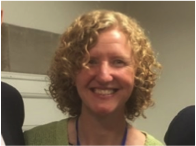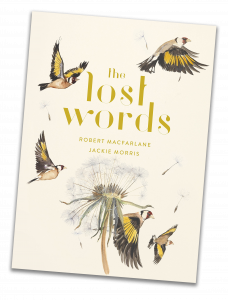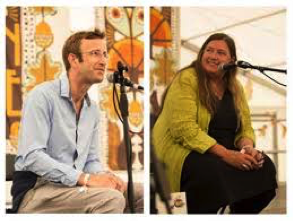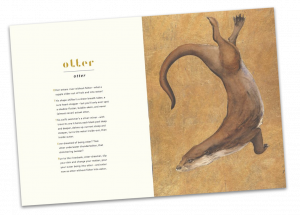By Liz Lord
 In this first of a series of blogs looking at the essential qualities of school mindfulness teachers, Liz Lord tracks the explosion in popularity of the children’s book, The Lost Words, by Robert Macfarlane and Jackie Morris, and explores the lessons we can learn from their experiences.
In this first of a series of blogs looking at the essential qualities of school mindfulness teachers, Liz Lord tracks the explosion in popularity of the children’s book, The Lost Words, by Robert Macfarlane and Jackie Morris, and explores the lessons we can learn from their experiences.
I first learned of the story of The Lost Words from my daughter, Annie, when she excitedly showed me a beautifully presented children’s poetry book written by the wonderful Robert Macfarlane, and illustrated by the equally wonderful Jackie Morris. I must admit, as with lots of things, the real impact of it didn’t hit me till a few months later when I went to a concert at the Royal Northern College of Music (RNCM) featuring this book. Possibly, the mix of these beautiful poems or ‘spells’ as they are called, and the authentic folk music, resonated more deeply with me in that setting. I was fascinated by the origins of this book and how it had captured the very heart and soul of the nation.
 Robert Macfarlane, a most gifted author and Professor of English at the University of Cambridge (and for the record, a truly beautiful man with a gift for nature and words), heard that the editorial team at the Oxford English Dictionary had replaced some words that they deemed no longer part of children’s vocabulary. Every time I mention these words to others for the first time, I have a similar reaction: disbelief or surprise, followed by expressions of sadness and despair.
Robert Macfarlane, a most gifted author and Professor of English at the University of Cambridge (and for the record, a truly beautiful man with a gift for nature and words), heard that the editorial team at the Oxford English Dictionary had replaced some words that they deemed no longer part of children’s vocabulary. Every time I mention these words to others for the first time, I have a similar reaction: disbelief or surprise, followed by expressions of sadness and despair.
The words, including; acorn, adder, bramble, otter, dandelion, and skylark have been replaced by such things as bitesize and files. “How can children not need to know what an acorn is?” was a common response. How is it that childhoods in the techno-age have lost their groundedness in the natural world and environment?
Robert responded to his own alarm at the situation by writing a poem (‘spell’) for each of the words that had been “lost” from the dictionary. Together with the immensely talented artist Jackie Morris, they produced a book called The Lost Words.
 This large (A2 size) book, captures in each page the real meaning and essence of the words in both prose and artistry. As news of this book has spread, and especially in the light of current concerns about both global and local threats to the environment, there has been a call for all primary schools in the country to have a copy on display in an attempt to reconnect children with the awe and wonder of landscape and the earth. Something would certainly be ‘lost’ if we didn’t help our children resonate with this vital elemental aspect to their lives.
This large (A2 size) book, captures in each page the real meaning and essence of the words in both prose and artistry. As news of this book has spread, and especially in the light of current concerns about both global and local threats to the environment, there has been a call for all primary schools in the country to have a copy on display in an attempt to reconnect children with the awe and wonder of landscape and the earth. Something would certainly be ‘lost’ if we didn’t help our children resonate with this vital elemental aspect to their lives.
There were stories on twitter of people rowing the book over to remote schools in Scotland, campaigns to fund the book being sent to all corners of the UK. Heart-warming and inspiring stories of passionate people on a mission to help children re-engage with these ‘lost words’.
A commission was granted to fund some of the finest traditional folk musicians to collaboratively produce music and songs to illustrate these ‘lost words and spells’. The result was a collection called ‘spell songs’, and a few concerts were set up around the country to share these interpretations.
Hence my attendance at the RNCM concert last year. It was a most moving experience, deeply connecting me to the meaning and essence of the words and the sentiment behind their important place in our rich vocabulary. The evening was a beautiful mix of prose, music and art, simultaneously being expressed on stage to nurture a deep resonance with the audience.
I was several times brought to tears.
 The whole experience of that concert was a feast of the senses. The purity of voice and instruments, watching Jackie Morris expertly craft an otter on canvas during the ‘otter song’, and also the fact that I had gone with a family friend, Anna and her sister Grace, who herself was a young, enthusiastic and talented primary teacher. All these elements of the evening seemed to tap into a deep personal conviction of wanting to pass goodness and beauty to the next generation through children and schools. A common cry of many a schoolteacher I know.
The whole experience of that concert was a feast of the senses. The purity of voice and instruments, watching Jackie Morris expertly craft an otter on canvas during the ‘otter song’, and also the fact that I had gone with a family friend, Anna and her sister Grace, who herself was a young, enthusiastic and talented primary teacher. All these elements of the evening seemed to tap into a deep personal conviction of wanting to pass goodness and beauty to the next generation through children and schools. A common cry of many a schoolteacher I know.
The sentiments of that conviction disturbed me when I later reflected on the pressures and workload, draining the energy, creativity and vibrancy of current life in the classroom and the pressures that are being placed on both the teachers and children alike with a relentless testing regime.
These reflections brought with them a deep sense of sadness and helplessness for the profession that I love and deeply care about and I wrote this in response;
Just as words can slip away from the pages, become obsolete in many eyes, and are lost,
So too can qualities slip away from our being, be left unnoticed, not appreciated and perhaps in time abandoned…
I reflected on all the qualities of the teachers I had known and loved over the years. Colleagues that have been kind, loving, creative, funny, knowledgeable, empowering, delighted, connected, resonance, expecting my best, knowing me fully, taking the time and so much more!
Are we in danger of losing these qualities in the young teachers we are forming? How are we fostering these qualities and how have we let more measurable things like attainment targets and statistics overtake the very qualities we know are important to help our children and young people flourish? We hear of so many difficulties with mental health and wellbeing. Could this be an attempt to address the very qualities we want to be surrounding our young people as they grow and mature? We are responsible as teachers and leaders for forming the children and young people in our care.
What are The Lost Qualities of our teachers and school leaders? How can we express the importance of these qualities so that they are fully present in our schools? How can these words be celebrated and used in the training of our young or new teachers in what is important as a foundational set of qualities to be at the heart of our profession?
Mindfulness in Schools Project is committed to supporting teachers and all those working in and alongside schools. Visit the new areas of our Hub to see information on:
- Supporting Your Practice
- Supporting your Teaching
- Supporting Your School
We are here to bring mindfulness to more schools. Email: support@mindfulnessinschools.org